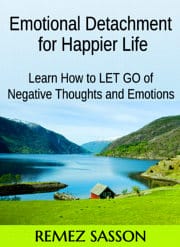
Do you often feel offended by what people say about you? Do you feel hurt? Most people do!
We want people to like us, even those we don’t know. This craving to be liked is a strong desire, and we feel offended if they don’t.
However, in reality, it wouldn’t be wise to expect everyone to like us all the time.
Browse our online courses on meditation, positive thinking, overcoming procrastination, confidence, and freedom from distractions.
We dress in a way we believe people will like. We often do foolish things to be liked, but this does not always work, and then we feel hurt.
There will always be people who disagree with us, criticize us, and say something unpleasant about us. This is part of human nature, and we need to accept it and not let it affect how we feel and react.
People love gossip
Most small talk conversations include some gossip about friends, colleagues, family members, or about famous people. But let’s be fair. Often, it is not done to hurt. It’s due to curiosity.
Taking things personally
If you take too personally what people say to you or about you, you will be unhappy most of the time. That isn’t very smart. Why should you suffer if someone said something you didn’t like? Forget it and move on.
You might say it’s impossible to ignore or forget. It’s possible, though this requires some training.
Do not Choose to Let People’s Words Affect You
Why do you let other people’s words affect how you feel? Why do you give them this power over you? Why allow others to pull your strings?
You shouldn’t take anything too personally. It’s not worth it.
Here are 7 reasons why you shouldn’t worry about what people say to you or about you.
Reasons Why You Shouldn’t Be Offended by What People Say
I want to point out a few reasons why you shouldn’t dwell on what people say about you. Understanding these reasons would help you stop taking things too personally and worrying about what people say about you.
When you learn to stop being offended, you gain peace of mind and become able to control your reactions and your life.
1. People Don’t Always Mean What They Say
Often, people say something in jest or without meaning any harm or criticism.
Sometimes, it is the wrong use of words. At other times, people might hit a weak spot without realizing it. In these instances, anger and resentment are out of place. You just hurt yourself and your relationship with these people if you let anger arise in you.
2. You Overhear Criticism and Assume It’s About You
At times, you might hear people criticizing or making fun of someone, and you wrongly assume that it is about you.
Often, people carry resentful and hard feelings toward others, and spoil the relationship, due to wrong assumptions and wrong information. Do you think it’s reasonable?
You should be sure it is about you instead of starting with negative self-talk, sulking, and being resentful.
3. You Cannot Control What Other People Think
Realize that you have no control over what people think and say, and that’s ridiculous always to strive to be the good boy or good girl in the eyes of other people.
It’s okay to have differences of opinion, different beliefs, and different expectations.
4. Criticism Is Part of Human Nature
No matter what you do, you will not avoid criticism. There will always be someone who will find fault with you. However, this is not a reason to break relationships.
Even your best friends and the people who love you might sometimes criticize you. That’s okay, and you need not take it personally.
If you allow yourself to be offended and keep thinking about their words, you hurt yourself, hurt others, and spoil relationships.
5. Take What People Say To You Or About You as an Opportunity to Improve
Sometimes, what others say about you is true, and therefore, getting angry is out of place. Thinking about what they said and realizing they are right shows maturity and is a big step toward moving forward and making progress.
Use criticism as a mirror to your weaknesses and negative habits and as a stepping stone to improve.
6. If You Allow Yourself to Be Offended, You Encourage People to Continue Offending You
In certain circumstances, feeling offended and taking things personally might encourage certain people to continue badgering you and even making fun of you.
They interpret your behavior as weakness and vulnerability and get joy from annoying you. Don’t fall into this trap. Stay calm, do not react angrily, and show maturity and discipline.
If you don’t play their game, they will let you be and stop bugging you.
7. Abstaining from Reacting Shows Inner Strength and Maturity
Abstain from reacting angrily, conducting negative self-talk, and dwelling on hurt feelings.
You might object and say that’s tough or impossible. Yes, it’s not easy, but it’s absolutely possible with some training.
Here are a few tips:
- Take a few deep breathes before saying anything.
- Wait a few seconds before reacting.
- Delay your reactions for a few seconds.
- Direct your thoughts to something else, to something funny or entertaining.
If you exhibit some self-discipline and self-control, you show inner strength and maturity, qualities that people respect.
Emotional Detachment – An Effective Tool
If you wish to handle this issue effectively, stop taking things personally, and stop getting offended by what people say, you need to develop a certain degree of emotional detachment.
It is the most effective tool for letting go and becoming free from anything that inhibits you and holds you down.
There are various situations in life where it is most valuable and worthwhile to display emotional detachment.
This is useful when you are in stressful situations, in the company of stressful people, when negative emotions overwhelm you, and when you tend to take things too personally.
Learn About Our Online Meditation Course
Various meditation techniques for finding inner peace, expanding consciousness, and awakening.
In these situations, emotional detachment enables you to stay calm, control negative reactions, and avoid being adversely affected by other people’s moods, anger, and state of mind.
Emotional detachment is a most helpful tool to free yourself from negative thoughts and negative feelings and not be offended easily.
This topic is well handled in the book Emotional Detachment for Happier Life .
Browse our online courses on meditation, positive thinking, overcoming procrastination, motivation, confidence, and freedom from distractions.


